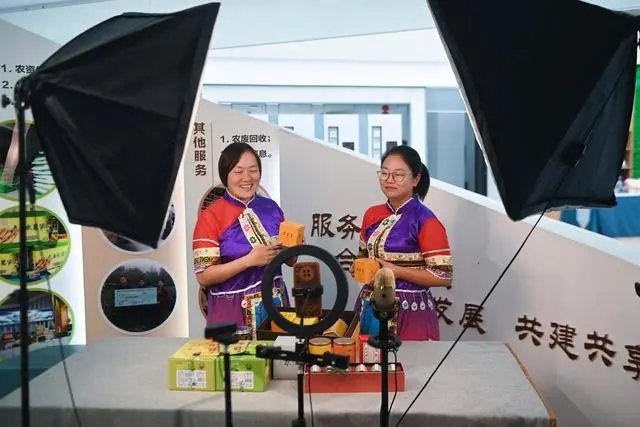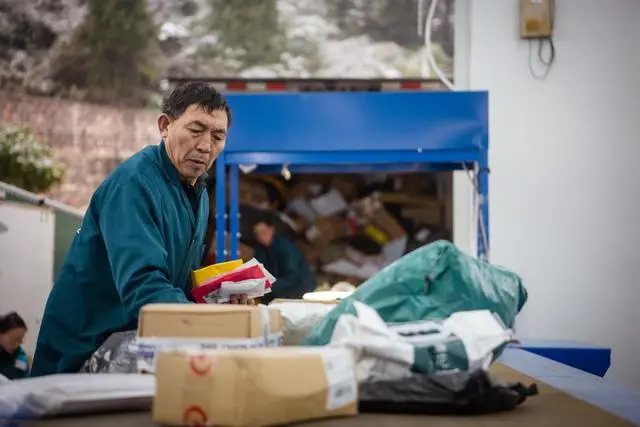Digital commerce brings new opportunities to China’s rural revitalization
China has continuously carried out a campaign to facilitate the development of agriculture by promoting digital commerce in rural areas.
In October 2021, the Ministry of Commerce, the Office of the Central Cyberspace Affairs Commission, and the National Development and Reform Commission jointly released a plan for e-commerce development during the 14th Five-Year Plan period (2021-2025), which pointed out that the country would implement the campaign.

Lyu Xin (left) and Gong Haiyan, members of the She ethnic group in Zhongshe village, Lin’an district, Hangzhou city, east China’s Zhejiang Province, advertise local specialties during a live-streaming session, Oct. 25, 2022. (Xinhua/Xu Yu)
The document “Opinions of the Central Committee of the Communist Party of China and the State Council on Comprehensively Promoting the Key Work of Rural Revitalization in 2023” proposed further implementing the campaign and an important project involving the internet-plus and the supply of agricultural products to cities.
As a result, rural areas across the country are embracing new opportunities for development.
Thanks to the implementation of the campaign, an increasing number of young people have moved to the countryside to contribute to rural revitalization.
Liu Yuanjie, born after 1995 in east China’s Jiangsu Province, is a live streamer who has become popular on Chinese internet in Yuli county, Bayingolin Mongolian autonomous prefecture, northwest China’s Xinjiang Uygur Autonomous Region.
When Liu traveled to Xinjiang, he found that the quality of local honey was of high quality, but the product didn’t sell well. He wanted to try to increase the sales of local agricultural and sideline products neglected by the market through live streaming.

Liu Yuanjie (right) and his colleague advertise honey during a live-streaming session. (Beijing News/courtesy of the interviewee)
For over a year, Liu has promoted honey via live-streaming sessions on short video platforms, garnering many followers and winning the trust of local beekeepers.
“Methods including live-streaming e-commerce quickly expanded the sales channels for honey,” Liu said, adding that he helped local farmers and herdsmen sell agricultural and sideline products worth over 20 million yuan ($2.9 million) via live-streaming e-commerce in 2022. He aims to sell 100 million yuan of products this year.
Liu is most concerned about how to attract and retain more young people to help rural residents become better off.
He has established a team of 30 members, most of whom were born in the 1990s and 2000s. “We offer skills training sessions on new-media operations and e-commerce marketing at a live-streaming center in the county,” Liu said, noting that he will build brands of agricultural and sideline products to help more farmers increase their income and secure employment.
More and more regions across China have begun to attach importance to nurturing e-commerce talent to advance rural revitalization across the board. They have provided policy support, adopted non-profit and market-oriented training methods, and improved the abilities of rural e-commerce talent.
Zhaodong city in northeast China’s Heilongjiang Province, for instance, has offered free training to eligible college students, young entrepreneurs, rural residents and ex-servicemen to cultivate e-commerce talent by leveraging platforms such as an e-commerce public service center, an e-commerce industrial park, and a live-streaming center.
China’s campaign to facilitate the development of agriculture by promoting digital commerce in rural areas has also boosted the construction of new infrastructure in rural areas and made the delivery, sorting, and processing of agricultural products smarter and more digitalized.
China has significantly improved logistics services in rural areas. According to data from the State Post Bureau, as of the end of 2022, the country had set up 990 county-level delivery centers and 278,000 village-level courier stations, and 95 percent of all administrative villages across the country had been connected to express delivery services.

A courier sorts parcels at the Xuan’en branch of China Post in Xuan’en county, central China’s Hubei Province, Feb. 22, 2023. The county has enhanced the building of a rural delivery logistics system, covering all its 140 administrative villages with delivery services. (Xinhua/Wu Zhizun)
Ouyang Rihui, assistant dean of the China Center for Internet Economy Research at the Central University of Finance and Economics in Beijing, said the campaign can enhance the connection between the production and marketing of agricultural products. The campaign, together with the project to bring express services to villages and the project involving the internet-plus and the supply of agricultural products to cities, will increase the penetration of e-commerce in rural areas.
Ouyang added that the campaign will accelerate the construction of new infrastructure in rural areas and improve rural e-commerce infrastructure, and the three-tier delivery system covering counties, townships and villages. It can facilitate the integrated development of e-commerce with the primary, secondary, and tertiary industries in rural areas, promote the digital transformation of industrial and supply chains in agriculture, and help upgrade agriculture and advance rural revitalization.
The campaign has also brought together enterprises, universities, and research institutes, thus boosting the commercialization of agricultural technologies and benefiting farmers.
Liu Dacheng, deputy director of the Institute of Internet Industry at Tsinghua University, said advancing rural revitalization through digital and platform technologies will be an inevitable trend. The campaign can facilitate logistics channels for agricultural products, advance the construction of e-commerce bases, spread science and technology in rural areas while improving varieties of agricultural and sideline products, and offer new impetus for further boosting rural revitalization.
Photos
Related Stories
- China revises down sugar output forecast for 2022-2023
- Tianjin sees cross-border e-commerce imports, exports rise in Q1
- China's e-commerce logistics sector logs steady growth in March
- Young man in SW China’s Yunnan leverages e-commerce to sell quality orah mandarins
- Amazon opens e-commerce training center in east China
- Online retailers expanding global footprint
- Small town weaves big industry with various nets
- 2023 China Cross-border E-commerce Trade Fair kickes off in Fuzhou, SE China
- E-commerce expos boom, as Chinese exporters explore new ways to sell overseas
- Cross-border e-commerce drives high-quality development of China’s foreign trade
- Thailand, China launch joint training program for e-commerce talents
Copyright © 2023 People's Daily Online. All Rights Reserved.









